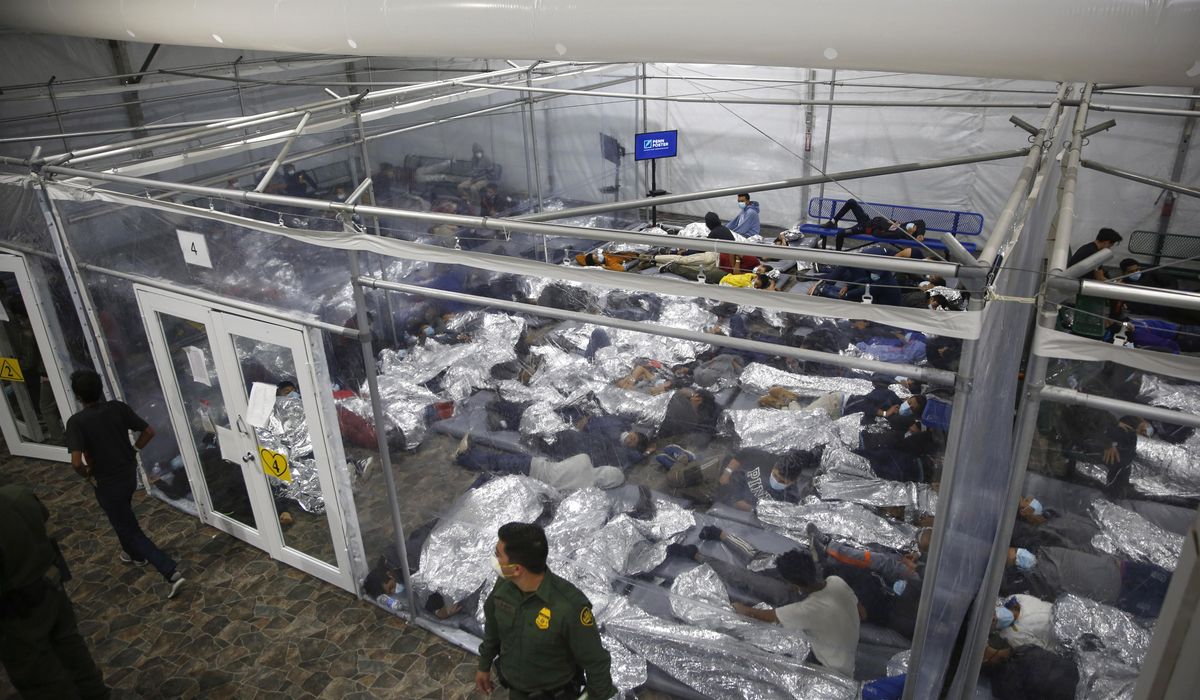


The Biden administration placed some illegal immigrant children with sponsors who got them pregnant, the Homeland Security Department said Thursday.
In other cases, minors who showed up at the border without parents were sent to live with adults who possessed child pornography, had serious criminal records or forced the children into labor.
Hundreds of thousands of these unaccompanied alien children surged into the U.S. as part of the Biden border breakdown. The administration struggled to process them. Facing overcrowded and dangerous conditions, it cut corners to push the children out of detention as quickly as possible, leaving some in unsafe placements, the government now says.
“Children’s safety and security is nonnegotiable,” said Laszlo Baksay, a spokesperson at U.S. Immigration and Customs Enforcement. “The previous administration’s failure to implement meaningful safeguards has allowed vulnerable kids to fall into the hands of criminals.”
Homeland Security Investigations, a division of ICE, has spent the past few months trying to check up on the children. Thursday’s findings grew out of that effort.
Some of the children were living in what ICE described as “neglect.” Others were with sponsors who had criminal records that included assault, drug trafficking, prostitution and attempted murder.
In what the agency called the “most disturbing cases,” girls were pregnant with children fathered by their “alleged sponsors.”
Unaccompanied alien children have long been among the toughest immigration cases, creating difficulties for all involved.
The children face horrific dangers en route to the U.S. Once in custody, they are supposed to be placed with sponsors who can look after them while they fight for permanent legal status.
Because of the sheer number of sponsors during the Biden administration, which in some early months topped 18,000, the government couldn’t vet sponsors properly under the rules inherited from the previous Trump administration.
The Health and Human Services Department loosened the requirements, but analysts said the result was more dangerous placements.
Federal watchdogs previously said the government had lost track of tens of thousands of children and failed to keep tabs on hundreds of thousands more.
The Trump administration vowed to track down the children it could, but welfare checks have been tricky.
Jarrod Sadulski, a child trafficking expert who has testified to Congress on these issues, said investigators made 100,000 attempts but located only about 5,000 children, or a rate of just 5%.
They identified more than two dozen cases that showed signs of trafficking.
Mr. Sadulski said HHS also ignored more than 65,000 calls to its UAC abuse hotline.
Sen. Charles E. Grassley, Iowa Republican, said last week that 7,300 of those calls involved accusations of trafficking and nearly 1,700 alleged fraud.
Mr. Sadulski said people could sign up as sponsors by identifying themselves with as little as a texted photo of a driver’s license.
That meant people with no connection to the children could pose as parents or other relatives and claim custody.
In one criminal case brought this year, authorities charged an illegal immigrant from Guatemala with fraudulently obtaining sponsorship of an unaccompanied alien child. He had submitted a badly photoshopped picture of himself and a woman to claim he was the child’s father, investigators said.
In a second instance, the man tried to claim sponsorship of another child with an ID that didn’t belong to him, investigators said.
HHS approved the first application but managed to deny the second one.
Federal prosecutors in New Mexico, meanwhile, brought charges against a 35-year-old man who they said paid to smuggle a 17-year-old girl to his home in Virginia.
Luis Alonso Argueta-Diaz told federal agents he was paying to have the girl come to a “safe place” and be a nanny for his three children, according to court documents. He admitted to paying $2,000 to the girl’s mother in Honduras. The girl said her total smuggling fee was $20,000, most of which was still outstanding.
Even as the welfare checks unveil troubling cases, immigrant rights groups complain that the stories are scaring migrants.
El Pais reported last month that more than 100 unaccompanied alien children had been displaced because of the checks.
“These welfare checks are planting fear, panic, and confusion among children and family members around the country,” Jason Boyd, vice president of federal policy for Kids in Need of Defense, told the news outlet. “Numerous minors have been subjected to deportation proceedings after such checks, which are by definition a tactic of migratory control.”
ICE, in announcing its findings Thursday, said immigration enforcement isn’t the purpose of the checks but said if agents or officers come across someone in the U.S. illegally, they will take them into custody.
The Trump administration has moved to tighten the rules on sponsorship to protect children. That includes requiring an unexpired authentic identification, which appears to be blocking many illegal immigrants from claiming sponsorship of their own children.
Just 45 minors were released to sponsors in April, down from more than 5,000 each month in late 2024.
A federal judge is deciding whether to block the Trump administration’s changes.
• Stephen Dinan can be reached at sdinan@washingtontimes.com.
